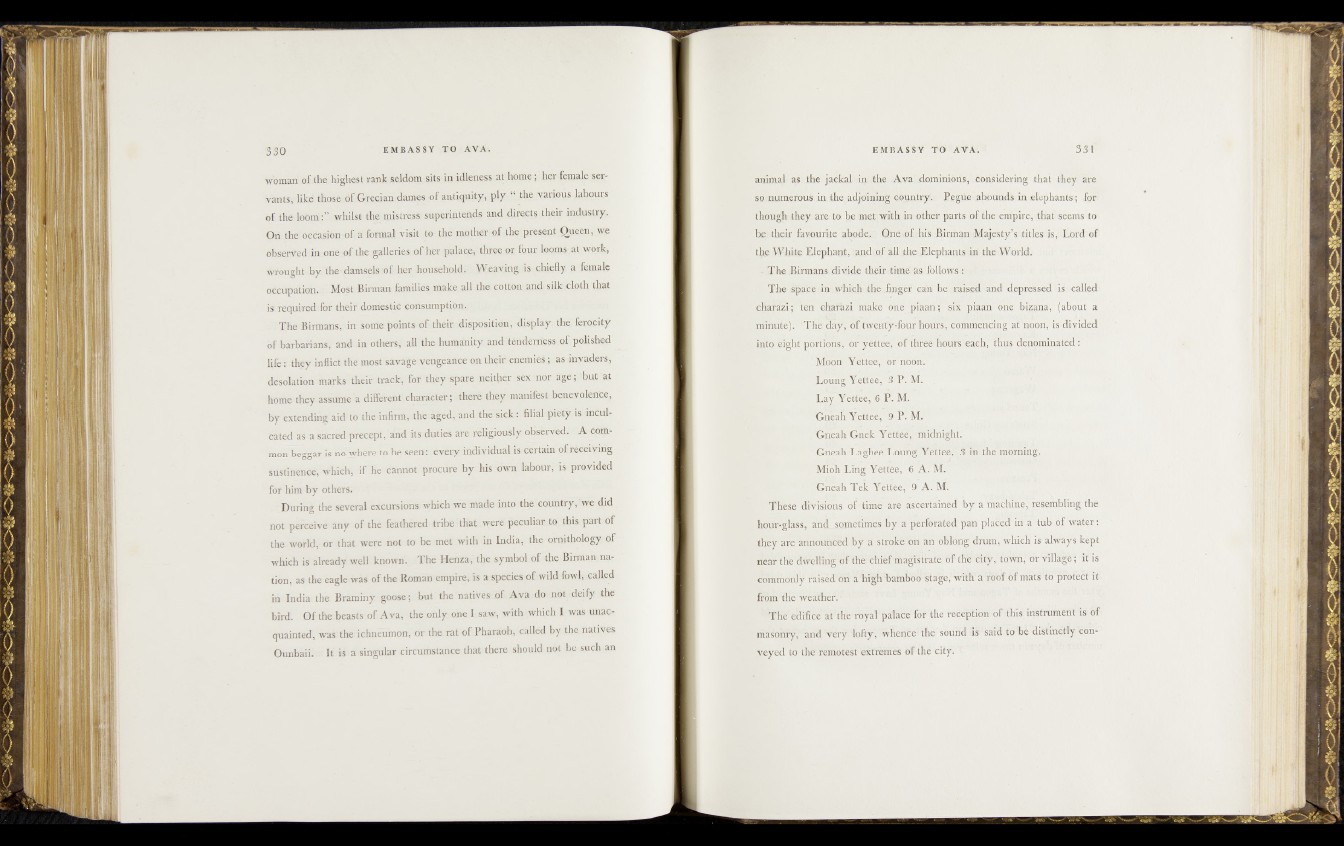
wbm ^ f ,#tth4'hlgk>s4 ran k seldom sits in idleness at home ; her female Pf*"
Vasts* like tàoseAfc%è®m,dames o f ^ f i p i t y , ply f i t o W &&KB9
o£ thelobm :’> whih* the m istred supéfhlteftds a&d-djrept§dh«àr industry.
jDô. thsloedaaihmofia’ forma? visit fe- thejmother-of .the;pfiesen$,Qyeên, we
observed in one of the galleries of hèvpjdaèe, three oç four looms at works,
households Weavihgnis-«chiefly a female
occupation,« Most Birman families make all .the- ebttpm and, sèl^cjpth'that
is required fortheir domestié .eensuroptipm; I
-, j'M e BirnaH^?iteShnfepomtrof them idispösiüd», -display the ferocity
of barbarians, and-in others? all'the humanity and tenderness: of polished
life : they inflict the most savage vengeance On llieir enemies ; as invaders,
desolation marks their track, for "they spare neither sex-nor age; but at
home they assume a different character; there they manifest benevolence,
by extending aid to the infirm, the aged, andrthe sick: filial piety is inculcated
as a sacred precept, and its duties are religiously observed. A common
beggar is nowhere to be seen: every individual is certain of receiving
sustinence, which, if lie cannot procure by his own labour, is provided
for him by others: j|
During the several excursions which we made into the country, we did
not perceive- any of the feathered tribe that were peculiar .to. this part of
the: world, or that were not to be met with in India, the ornithology óf
which is already well known. The -HenfaJ the symbol gf the Birman nation,
as the eagle was of the Roman empire,, is a species o f wild fowl! called
in India the: Bràminy goose : but' the natives _of A va do not -deify the
bird. Of the beasts of A va, the-.only one I saw, with’which I was unacquainted,
was the ichneumon, .or the rat of Pharaoh, called by the natives
Ounbaii. If is a singular circumstance:that there should not be.sudvan
animal as ihe jfiekalwii^ifhe AvaIah?mMdriSi!>eonsidermg that fheydare
S9 Bemerhus' in, the adjdhpnjr q foqtiftb: Pegueiaboundkiin «fephant®; |fj6
though dhey ane. to lie m et wiithirunlbe'C pants kds Mae;hpiplre§ (th’atitseems' to’*
bpi thear fasiburite absflnst Qne>offihikjBinmamAftajeste)5’s;itit'lesils,£'lIi0rd of
tl^g White IJdepha&t, lABPtef 'ail fhfti/Iephafsfc'jki fheiWerld; 'n
- The Birmans divide theigdi'meV&s^ifelkaM^ ^ p
' The- spate sin . which the,Jj&ggir caw0ei$||i6ed'tand (depressed is x:al>led»
cfiani/i: ten rhadi/i mS^vmM[iiai(li?>six'JpjJHn one ,b/z ipaV al/o.ut S
minute' Hie day’ o (u vv enfy’- l < r ': 'J'oihmeneidgM^Soir/i£ Ui\ ided
inlo ugfjfpcraoffls bnycrapSf dt'Bu^^m^'each, thus cfenmninaicd‘ ;
'- "''Lay YettW, 6 P . M.
^ P |||n ||l i Yetteejf^ P. M.
Gneah Gnek Y
* (Jm .ml^Me^Edim^Yetree, S' in thoTnOTniim. ’
A. M.
V*$fefieah Tek Mt'*'
p£'*J%ese divisions outline aie asteituned bjr i mechme lcsembhitg the-
hour-«lass, and "sometimes b / a perforated pan pldvecl? m a tub of w ater:
they are"hdriouK^d' b^Vtf■ stfoEb^n apYiRfong1 ill urn,’ 1v1ik.1i n aftiaj,» kept
rfebthe ^Veiling'of tfieVhief niaglstfate of tf f i^ ty ,9^ ^ * ^ Ullage: i f is
cfeirimonly ra isedY )S ah i^% y nDW ^ a^ ,!wh'h'a‘^OT ofmat^td^PotfecIf'iff
frormthe'WeatfceiV' *
?>!The'ekffice at tfie royaPpalfifie^fthe' mbefitio&mfIMkfflSti^W© o f
m’asbftify, and very ioftyV whence' tlicf .sBuffdifi^'Said to h e 'distinctly conyeyed
to the remotest extremes oFihe ciiy’i X !